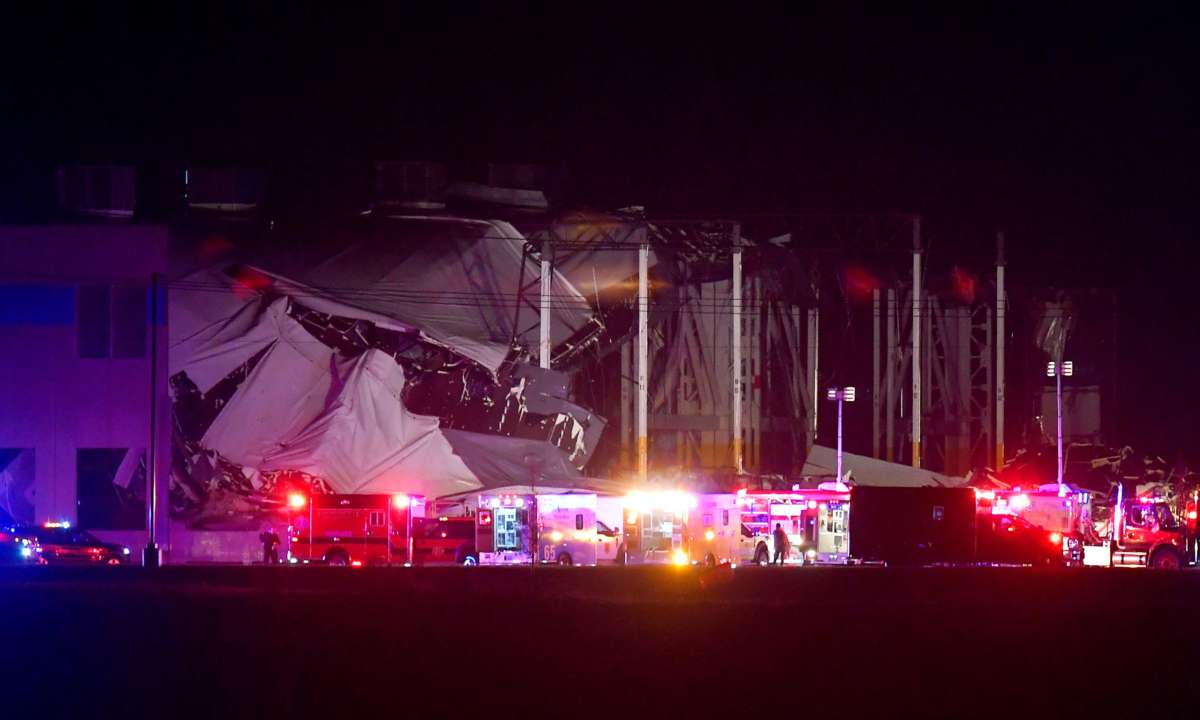Truthout is an indispensable resource for activists, movement leaders and workers everywhere. Please make this work possible with a quick donation.
Amazon was accused Saturday of putting corporate profits above worker safety following the tornado-caused partial collapse of a St. Louis-area warehouse that left at least six people dead.
“Time and time again Amazon puts its bottom line above the lives of its employees,” said Stuart Appelbaum, president of the Retail, Wholesale and Department Store Union (RWDSU), in a statement. “Requiring workers to work through such a major tornado warning event as this was inexcusable.”
Appelbaum’s remarks came after an outbreak of over 20 devastating tornadoes late Friday tore through multiple states and killed dozens of people. In addition to Illinois, affected states included Arkansas, Kentucky, Mississippi, Missouri, and Tennessee.
Among the buildings struck was an Amazon facility in Edwardsville, Illinois — a community about 30 minutes from St. Louis. Local officials said Saturday that at least six people died from the collapse.
Local KMOV reported:
The walls on both sides of the building collapsed inward, causing the roof to fall. The 11-inch-thick, 40-feet-tall walls could not sustain the tornado that hit the building Friday night.
The National Weather Service confirmed that it was a category EF-3 tornado that went through Edwardsville Friday night. Winds picked up to as much as 150 mph.
The number of workers inside the building at the time of collapse is not yet determined. Edwardsville Fire Chief James Whiteford said at a press conference late Saturday that one person was injured and 45 people were rescued.
According to the St. Louis Post-Dispatch:
By Saturday evening, first responders had shifted from an emergency response to a recovery effort. While they would continue to go through the rubble during daylight hours over the next three days, Whiteford said he doesn’t know whether any other victims will be found inside.
Shortly before the facility was hit the National Weather Service’s Storm Prediction Center warned of an increasing “damaging wind and tornado threat” for the area.
702pm CST: Technical discussion within Tornado Watch for portions of eastern Missouri and western Illinois including the St. Louis Metro area… the tornado and damaging wind threat is increasing. https://t.co/fiICIQyQF3 pic.twitter.com/63slr001FK
— NWS Storm Prediction Center (@NWSSPC) December 11, 2021
As some observers pointed out on social media, Amazon has previously failed to close warehouses in the face of extreme weather events:
In the last 6 months, Amazon has repeatedly refused to shut down warehouses in the midst of extreme weather events: the June heatwave, Ida in September, now this tornado. There are injuries and reports of deaths in the warehouse. Fucking nightmare. https://t.co/uWnHxjCBh7
— Nantina Vgontzas (@nantarsya) December 11, 2021
https://twitter.com/blkahn/status/1469775448502640641?ref_src=twsrc%5Etfw%7Ctwcamp%5Etweetembed%7Ctwterm%5E1469776627668295688%7Ctwgr%5E%7Ctwcon%5Es2_&ref_url=https%3A%2F%2Fwww.commondreams.org%2Fnews%2F2021%2F12%2F12%2Finexcusable-amazon-under-fire-after-warehouse-collapse-kills-least-six
“How many workers must die for Amazon to have a policy for extreme weather events?” sociologist Nantina Vgontzas tweeted Saturday. “It’s currently up to local management and this is clearly disastrous. Condolences to the families and survivors of this horrific, avoidable tragedy.”
In his statement, Appelbaum called the event “another outrageous example of the company putting profits over the health and safety of their workers, and we cannot stand for this.”
“Amazon cannot continue to be let off the hook for putting hardworking people’s lives at risk,” he said, vowing that his union would “not back down until Amazon is held accountable for these and so many more dangerous labor practices.”
Adding to the fresh scrutiny of the online giant’s labor practices, as Bloomberg reported Saturday, are its policies regarding employees’ mobile phone access. From the reporting:
Amazon had for years prohibited workers from carrying their phones on warehouse floors, requiring them to leave them in vehicles or employee lockers before passing through security checks that include metal detectors. The company backed off during the pandemic, but has been gradually reintroducing it at facilities around the country.
“After these deaths, there is no way in hell I am relying on Amazon to keep me safe,” one unnamed worker from another Amazon facility in Illinois told Bloomberg. “If they institute the no cell phone policy, I am resigning.”
A terrifying moment. We appeal for your support.
In the last weeks, we have witnessed an authoritarian assault on communities in Minnesota and across the nation.
The need for truthful, grassroots reporting is urgent at this cataclysmic historical moment. Yet, Trump-aligned billionaires and other allies have taken over many legacy media outlets — the culmination of a decades-long campaign to place control of the narrative into the hands of the political right.
We refuse to let Trump’s blatant propaganda machine go unchecked. Untethered to corporate ownership or advertisers, Truthout remains fearless in our reporting and our determination to use journalism as a tool for justice.
But we need your help just to fund our basic expenses. Over 80 percent of Truthout’s funding comes from small individual donations from our community of readers, and over a third of our total budget is supported by recurring monthly donors.
Truthout’s fundraiser ended last night, and we fell just short of our goal. But your support still matters immensely. Whether you can make a small monthly donation or a larger one-time gift, Truthout only works with your help.
